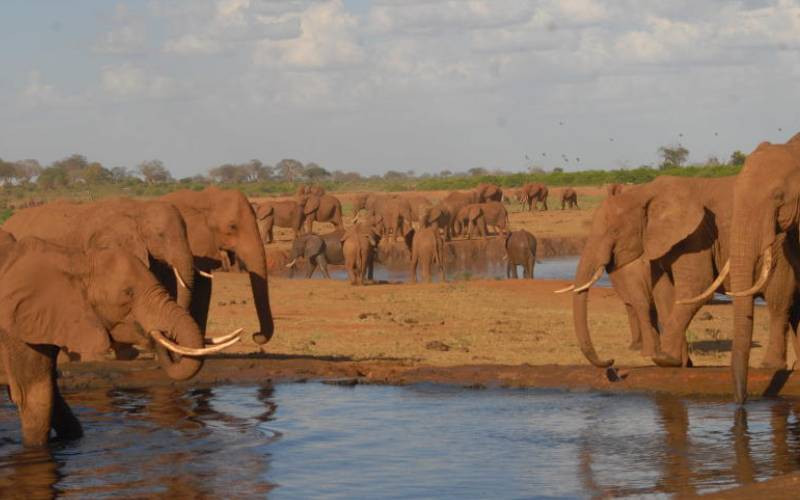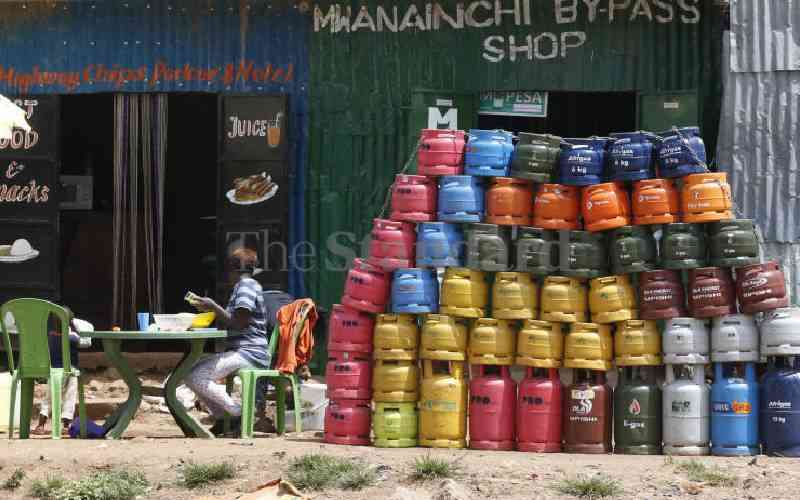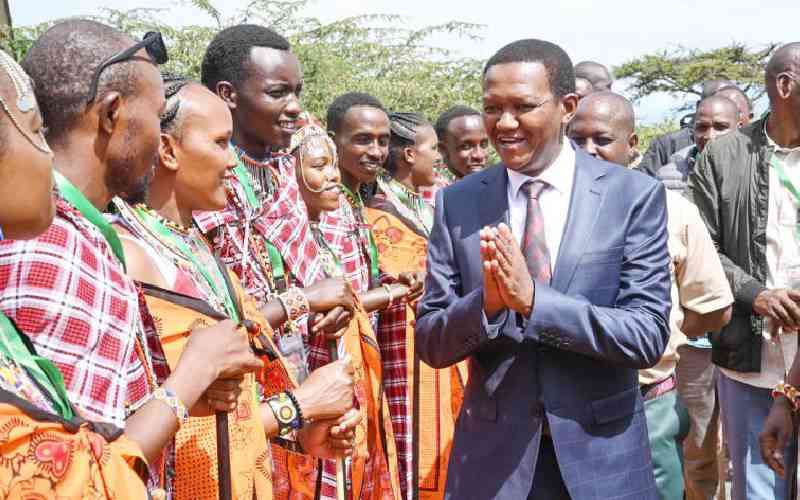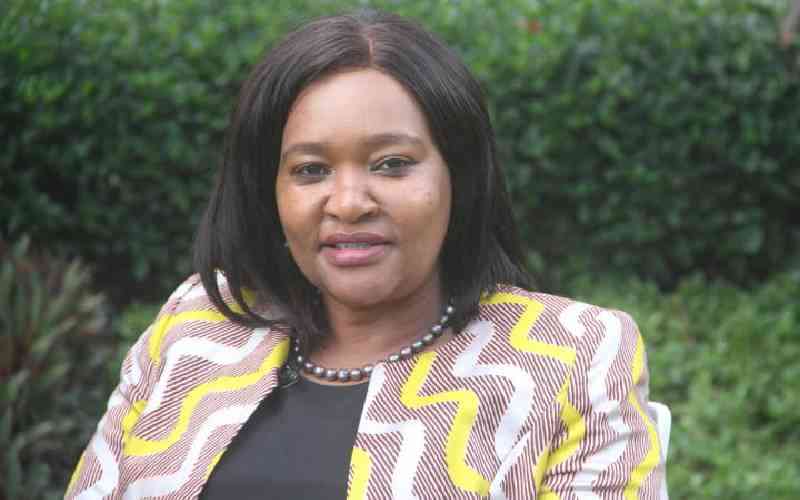By Standard Team
Kenya’s diplomatic efforts to build a coalition of countries behind its ongoing military action against Al Shabaab insurgents in Somalia is bearing fruit as more countries voice their support.
Efforts to strengthen the African Union peacekeeping force in Somalia have also intensified. Countries contributing troops to the African Union Mission in Somalia (Amisom) were meeting on Monday alongside regional nations to discuss the future of the mission. African Union spokeswoman Lulit Kebede said defence ministers from Uganda and Burundi, which both have troops in Somalia, and "interested countries" Djibouti, Kenya and Ethiopia will attend the closed meeting.
 |
Administration Police from the Rapid Deployment Unit sail out of Lamu jetty on Monday. They are keeping vigil around most hotels in Lamu County. Photo: Maarufu Mohamed/Standard |
"The meeting should address the matters relating to the political, security and military operations in Somalia and to Amisom ... and the way forward on the situation in Somalia," according to a statement.
The ministers, meeting in the Ethiopian capital, also discuss a UN resolution on maintaining the mission until October 2012.
Amisom is made up of 9,000 troops from Uganda and Burundi. Djibouti and Sierra Leone have pledged to contribute additional soldiers, which would bring the total number of troops to 10,700.
The AU force is tasked to protect the Western-backed Transitional Federal Government (TFG) of Somalia.
Within the African Union, South Africa, Nigeria, Ethiopia, Tanzania, Uganda, Burundi and Rwanda have all backed "Operation Linda Nchi" as the Kenyan offensive is dubbed.
Western nations, including France, Britain, Poland Germany and the US have also expressed support for Kenya’s efforts to protect its territorial integrity, further increasing the isolation of Al Shabaab.
The Sultanate of Oman became the latest country to back the offensive by the Kenya Defence Forces and soldiers of Somalia’s Transitional Federal Government inside the war-ravaged country.
Meanwhile, Prime Minister Raila Odinga has won promises of support from Israel to boost the capacity of the Kenya Police to battle terrorism inside the country.
The PM particularly sought help for Kenya’s internal security challenges saying Kenya is dealing with a new kind of criminal.
"That threat calls for more advanced and improved security measures, including more surveillance and capacity of Kenya Police to preempt criminals instead of pursuing them after the act," he added.
Raila said Israel could help the police build its capacity to fight terrorism and prevent attacks inside its borders.
Sea surveillance
The internal security threats, combined with the piracy in the Indian Ocean, he said, pose a big threat to Kenya’s economy, particularly tourism and needed to be dealt with urgently and appealed for vehicles for border patrol and equipment for sea surveillance.
"We need to be able to convincingly ensure homeland security. Only that will ensure tourists keep coming, our people can go on with their lives as they have always and we don’t lose people who have no reason to die," he added.
"Kenya has stood on the side of Israel at its hour of need. Consistently, Kenya has shown a very positive attitude towards Israel and Israel is ready to help," Israel’s President Shimon Peres said.
Israel’s Prime Minister Benjamin Netanyahu called on the international community to rally to Kenya’s side, saying patrolling the high seas is in the interest of all nations, not just Kenya’s.
Both countries were to sign a memorandum of understanding for cooperation on matters of homeland security on Monday.
Netanyahu accepted Raila’s invitation to visit Kenya early in 2012.
The news came as President Kibaki assured Kenyans the country’s security forces would not rest until all borders are secure.
Thanking Kenyans for supporting the military operation in Somalia, Kibaki said peace and stability are the cornerstones for Kenya’s development and appealed to them to report persons likely to threaten national security.
"As Kenyans we must all play our rightful role in maintaining peace," the Head of State said on Monday when he officially launched the Sh1.4 billion rehabilitation of the Eldoret-Ziwa-Kachibora and Kachibora-Moi’s Bridge roads at Ziwa in Uasin Gishu County.
On Sunday, suspected American missiles hit an Al Shabaab camp in Afgoye, a stronghold of the Al Qaeda-linked insurgents, 30km from the capital Mogadishu.
Military Spokesperson Major Emmanuel Chirchir said Kenya was not behind the strong explosions, though he said they came during an Al Shabaab meeting in the town.
Loud explosion
"I’ve never heard such an explosion in my life," Afgoye resident Mohamud Abdi Ali told Reuters news agency.
"It didn’t explode in the town, but I think it exploded near Al Shabaab’s military camps," he said.
Afgoye is a strategic junction on the road leading from the capital to the south of the Horn of Africa nation. The United States has used drones in the past to target top Al Shabaab officials.
Other residents living between Mogadishu and Afgoye said they saw a bright light streaking overhead in the night sky. The insurgents reported two other explosions on Sunday night in the K50 area, 50km from the capital.
"Some of these explosions happened at Shabaab military camps and checkpoints but nothing is quite clear so far," he added.
"There was another heavy explosion near Lantaburo, there was fire and smoke but I cannot say what exactly happened," Mohamed Ali, another witness in K50 area said by telephone. The United States said last month it was flying unmanned drones out of neighbouring Ethiopia, as part of a counter-terrorism campaign in the Horn of Africa but said the aircraft were unarmed and not carrying out raids.
African Union troops fighting al-Qaida-linked Islamists in the failed state of Somalia have a $10 million funding gap, which has delayed the deployment of reinforcements and lifesaving equipment, officials said.
The 9,100-strong AU mission was authorised to reach 12,000 a year ago, but has not yet reached its full strength. The AU mission had a budget of $472 million in 2011, but most of the money is taken up by wages, transport and operational costs.
In Israel, PM Raila also appealed for more assistance with irrigated agriculture particularly in northern Kenya and other arid parts of the country, as a way of converting pastoralists to more sedentary life, a proposal the two Israeli leaders promised to support.
Raila together with Saitoti and Ngilu will witness the signing of the MoU on internal security cooperation then hold further talks with Deputy Prime Minister and Minister for Foreign Affairs Avigdor Liberman, Speaker of Knesset Reuven Rivlin and Opposition leader Tzipi Livni.
Raila was also scheduled to attend a plenary session of the Knesset, the Israeli parliament.
 The Standard Group Plc is a multi-media organization with investments in media
platforms spanning newspaper print operations, television, radio broadcasting,
digital and online services. The Standard Group is recognized as a leading
multi-media house in Kenya with a key influence in matters of national and
international interest.
The Standard Group Plc is a multi-media organization with investments in media
platforms spanning newspaper print operations, television, radio broadcasting,
digital and online services. The Standard Group is recognized as a leading
multi-media house in Kenya with a key influence in matters of national and
international interest.
 The Standard Group Plc is a multi-media organization with investments in media
platforms spanning newspaper print operations, television, radio broadcasting,
digital and online services. The Standard Group is recognized as a leading
multi-media house in Kenya with a key influence in matters of national and
international interest.
The Standard Group Plc is a multi-media organization with investments in media
platforms spanning newspaper print operations, television, radio broadcasting,
digital and online services. The Standard Group is recognized as a leading
multi-media house in Kenya with a key influence in matters of national and
international interest.










